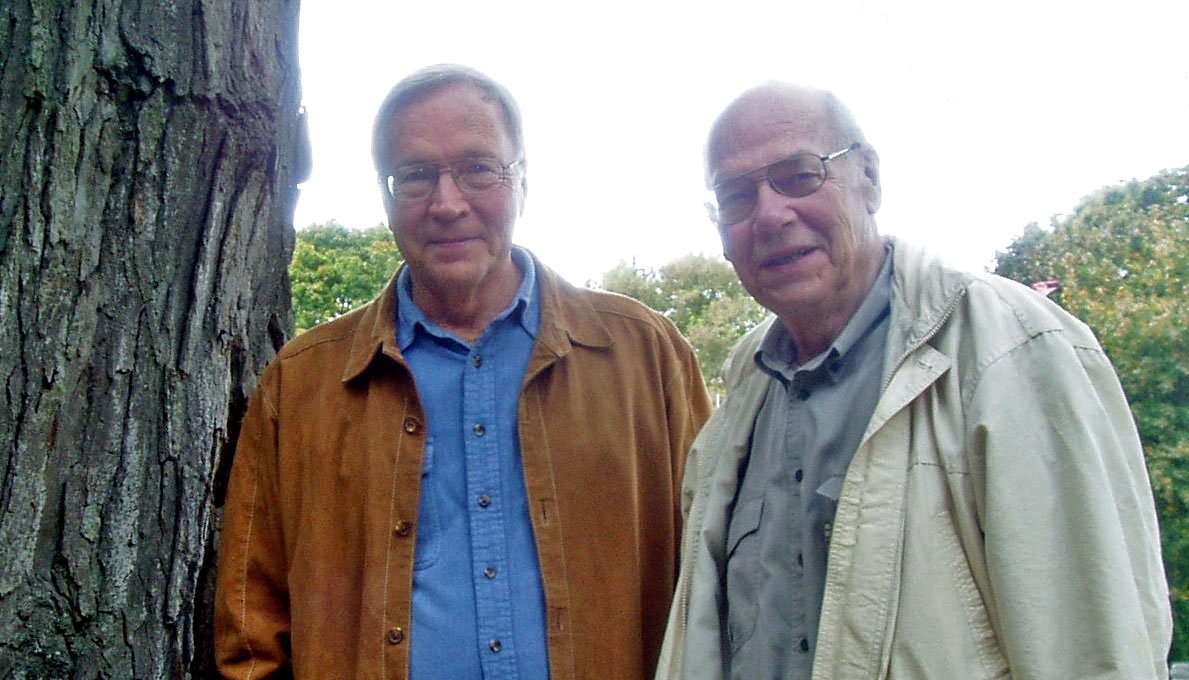Telegdi (right) in Queenston, Ontario, in 2013, standing with Westhues next to an acacia tree planted by William Lyon Mackenzie in 1824, to celebrate the beginning of his campaign for democracy in Upper Canada.
 |
K. Westhues Homepage |
UNSCRIPTED, UNSPUN
|
Telegdi (right) in Queenston, Ontario, in 2013, standing with Westhues next to an acacia tree planted by William Lyon Mackenzie in 1824, to celebrate the beginning of his campaign for democracy in Upper Canada.
|
|
Wikipedia entry on Andrew Telegdi
|
A long, successful political career sometimes rests on strengths markedly different from the usual ones. A case in point was Andrew Telegdi, Waterloo’s Member of Parliament for fifteen years, from 1993 to 2006. He won five elections handily and lost the sixth by seventeen votes. The seat he held was not safe for a Liberal. Conservative Walter McLean held it capably from 1979 to 1993, and New Democrat Max Saltsman for eleven years before that. Telegdi had no family wealth behind him, no Oxbridge polish, and no ancestral roots in Canada. No one but he himself made his surname recognizable in this country. He was not a charismatic orator. His speech was stumbly. Born in Hungary, he sounded like a more recent immigrant than he was. Nor was Telegdi a media darling. Many journalists found him scrappy and combative. Yet Telegdi had an authenticity that made up for his liabilities. How he handled a gaffe in the 2008 campaign shows what led so many thousands of voters to keep checking the box beside his name. In his opening statement at the main all-candidates debate, sponsored by The Record and Rogers at RIM Park on September 23, Telegdi misspoke. Misreading a five-letter word, he said the number-one job was to elect Stephen Harper as Prime Minister. The word he meant to say was “eject.” Snickers, then applause rippled through the Young-Tory segment of the audience. All of us on the campaign team winced as our candidate soldiered on, unaware of his mistake. We knew the fumble was too luscious for our opponents to ignore, that it would be on YouTube by morning. The question was how to handle it. My suggestion was a video statement by the campaign chair, that in a nation of immigrants like ours, people of good will routinely overlook mispronounced words and slips of the tongue. Damage control, I thought, the right spin. The rest of the campaign team agreed. The candidate thought better. The next morning he himself recorded a YouTube clip in his inimitable elocutionary style. It is still online. “You have to have humor,” Telegdi began, “when you run in an election, and I must say, last night at our first debate on Rogers, with the other candidates, I sort of stepped into it.” Telegdi was incapable of spinning anything. His supporters might advise him on the politically wise thing to do. He might even try to do it. In the end, the inner Telegdi always surfaced. What you saw is what you got. Voters loved him for it. He was honest to a fault, unscripted, unspun. Plainspokenness was hardly the only factor that kept Telegdi in Ottawa so long. He worked hard on his constituents’ behalf, especially in boosting this Region’s high-tech and education sectors. In a parliamentary system like ours, any politician’s career depends more than anything on the party and its leader. Telegdi’s edge was that he remained his own man. His party loyalty was always tempered and sometimes compromised by allegiance to higher principles, especially those set down in the Canadian Charter of Rights and Freedoms. Our campaign literature always highlighted Telegdi’s record on this score: his defense of civil liberties and the rights of citizenship even in defiance of the Liberal leadership, his success in working across party lines, his support for parliamentary structures that let MPs openly voice the concerns of their constituents. Helping in his campaigns, I was often struck by the depth of Telegdi’s respect for ordinary Canadians. In no way did he consider himself superior. Democracy was in his bones. This showed in his obsession with loading information into brochures and ads. Advertising experts advise to the contrary. Less is more, they say. Better a few catchy slogans than long paragraphs that nobody reads. Telegdi thought otherwise. We once had campaign ads ready to go for the UW and WLU student newspapers, when Telegdi proposed adding a statistical table. I told him the ads were already packed too full, that the font size was already so small readers would have to squint. “That’s okay,” Telegdi pressed on, “students are smart. They want to understand what this election is about.” It was the inner Telegdi surfacing. He had confidence in ordinary people’s intelligence. He did not treat voters as pawns to be played but as citizens to be informed, listened to, argued with, commended when they agreed with him and lambasted when they did not. Waterloo voters could not have given Telegdi a better thank-you gift for his lifetime of political service than their election of his protégée and former assistant, Bardish Chagger, in 2015. She serves much the same values as her mentor did. With Bardish Chagger in Parliament, and in Justin Trudeau’s cabinet no less, despite Donald Trump holding power in Washington, Andrew Telegdi will rest in peace. |